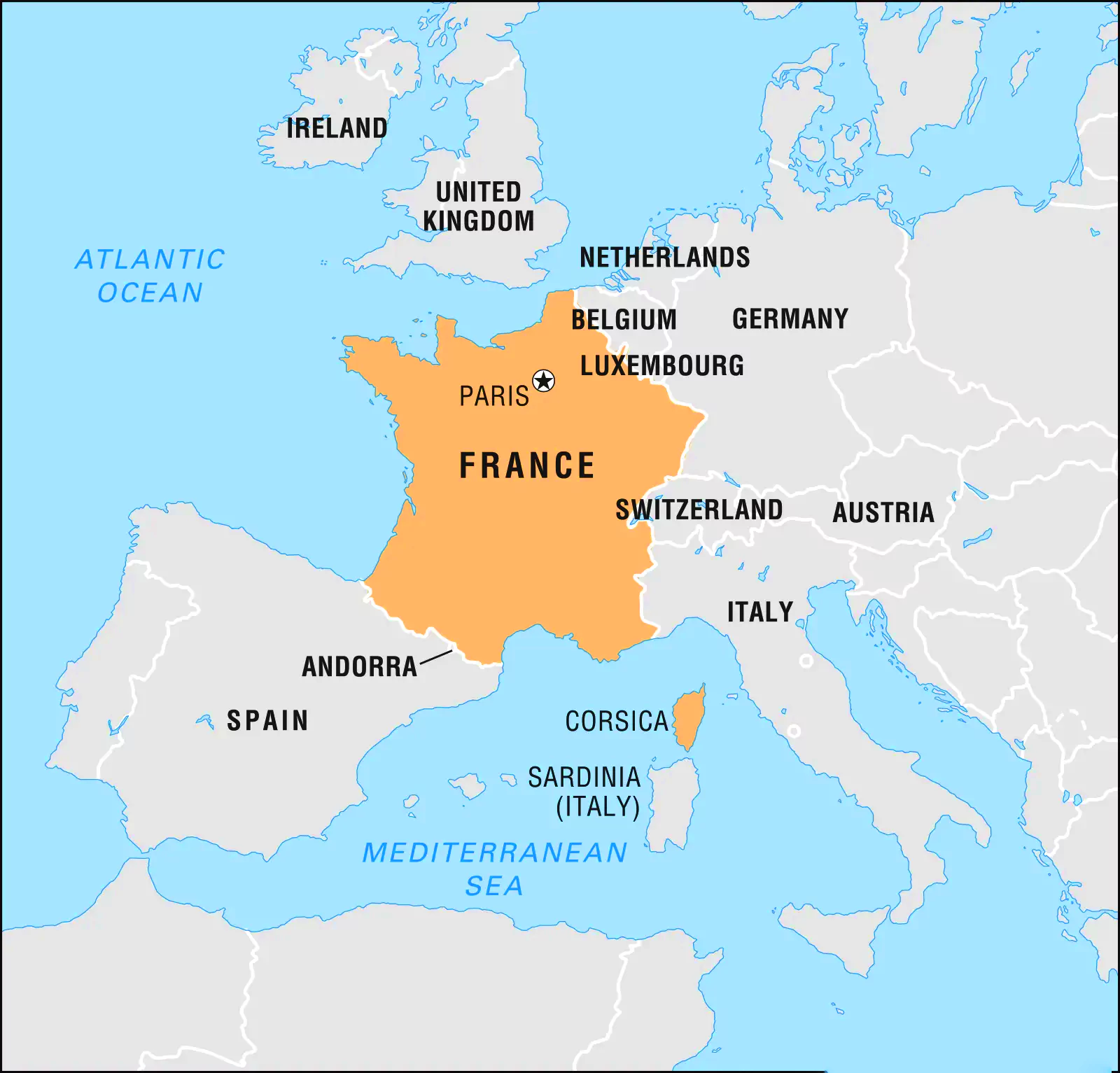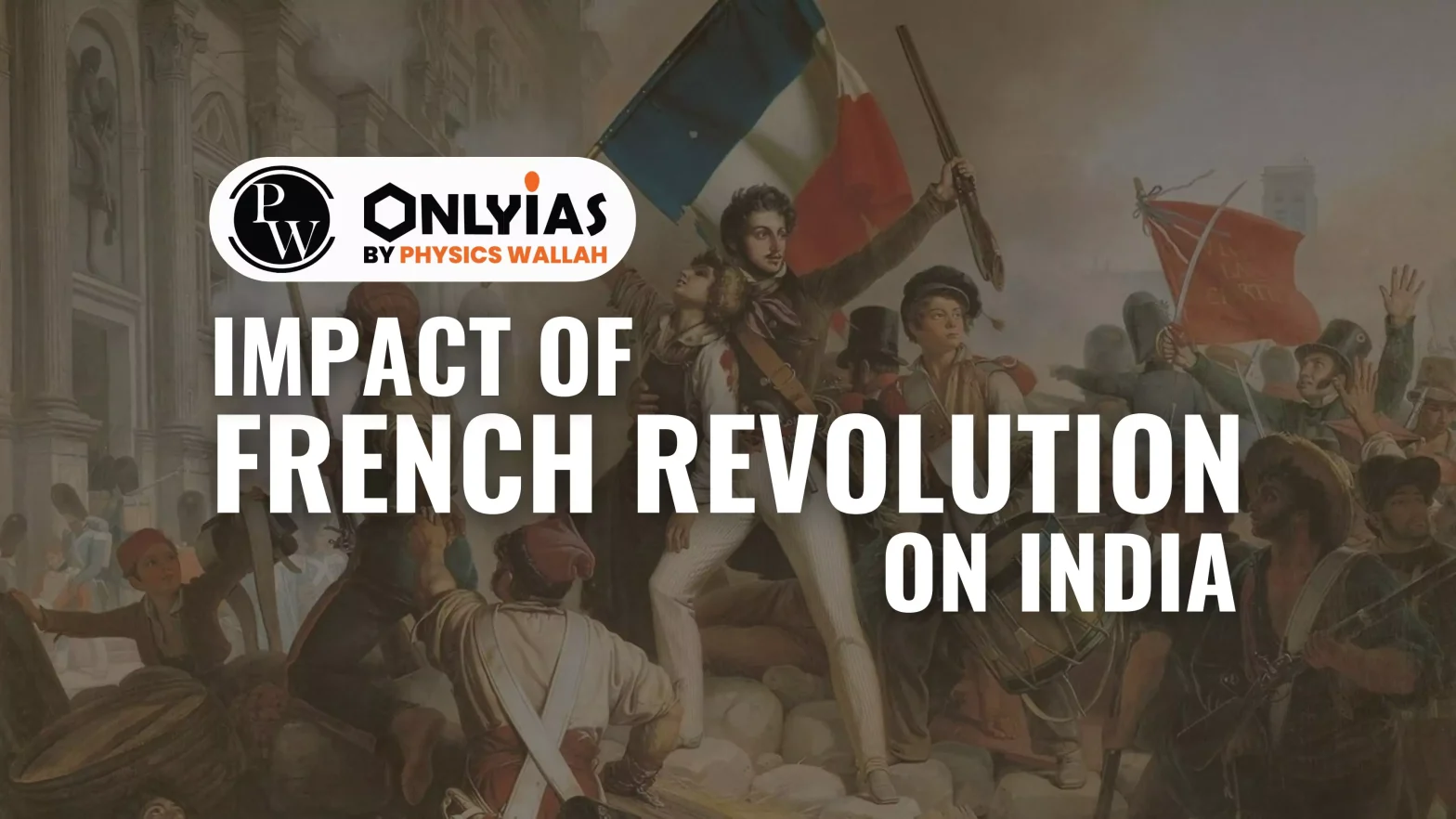The French National Day, also known as Bastille Day is celebrated on July 14 each year, on the anniversary of the storming of the Bastille prison in Paris in 1789.
- Last year, the Indian Prime Minister graced the Bastille Day celebrations in France.

About The French Revolution
The French Revolution marked the collapse of the French monarchy and the traditional social order, signalling the end of absolutism and the rise of secular, democratic governance.
- Time Period: The French Revolution was a period of radical social and political upheaval in France from 1789 to 1799.
- Characterised by: Significant changes in the country’s political, social, and economic systems, as well as profound cultural and intellectual transformations.
Enroll now for UPSC Online Course
Impacts of the French Revolution
The revolution had a profound impact not only on France but also on the rest of Europe and the world, inspiring other movements for liberty, equality, and democracy.
- End to Monarchy: The French Revolution put an end to the age-old absolute monarchy, feudal laws and social inequality.
- Introduction of Modern Ideals: For the first time ideas like “Liberty, Equality and Fraternity” were introduced.
- Growth of Socialism and Communism: It indirectly laid the groundwork for the growth of socialism and communism by providing an intellectual and social environment in which these ideologies could flourish.
- Fostered a Strong Sense of Nationalism: By emphasising the collective will of the people and promoting the concept of self-determination.
- Inspiration to Other Revolutionary Movements: It sent shockwaves throughout Europe, inspiring further revolutionary movements and challenging traditional monarchies, ultimately leading to the rise of Napoleon and a period of conflict and change.
Influence of the French Revolution on Indian Constituent Assembly and India
India, along with several other countries which underwent decolonisation were inspired by the French revolution.
- Tree of Liberty by Tipuu Sultan: Tipu Sultan, the ruler of Mysore in the late eighteenth century, is famous for planting the Tree of Liberty in his capital Seringapatam and calling himself ‘Citizen Tipoo’.
- Preamble of the Indian Constitution: The Indian Constituent Assembly adopted the first few lines of the Preamble to India’s Constitution from the French Revolution.
- The Preamble grants the Liberty– of thoughts, expression, belief, faith and worship, Equality of – status and opportunity (to its citizens), and, to promote among them all, Fraternity assuring the dignity of the individual and the unity and integrity of the Nation.
- The Idea of Republic: Republic means reserving the highest office of the state for an elected representative, symbolising governance by the people themselves. By overthrowing its monarchy, the French broke the myth of the invincibility of monarchies across the world.
- The Constituent Assembly on the Preamble began its debates in October 1949. The idea of Equality was already codified by this time.
- Example: India abolished titles (Article 18), introduced universal adult franchise (Article 326) and argued for equality with principles of equity as the Fundamental Rights of citizens (Articles 14, 15) and numerous others.
- Secularism and Fraternity: The Indian Constitution makers took another lesson from France in terms of the idea of Secularism and Fraternity. However, secularism in India and France is not the absence of religion.
- After the French Revolution, Napoleon Bonaparte made an agreement called ‘Concordat’ with the Pope that allowed for overseeing the power of the state over the affairs of the Church.
- It was a compromise which Napoleon did to sustain religion within the State.
- Secularism in Indian context is not the absence of religion altogether but presence of all sects and religion in equal terms.
- Hence, the state provides grants to all religious denominations (Article 25 imparts freedom of conscience and free profession, practice and propagation of religion and Article 26 gives freedom to manage religious affairs).
History of the French in India
The French were the last Europeans to reach India as traders, Portuguese followed by the British, the Dutch, the Danes and the French.
- Foundation: The foundation of Compagnie des Indes Orientales (The French East India Company) in 1664 was laid down by Jean-Baptiste Colbert, a minister in the court of Louis XIV.
- Joint Venture Company: The French East India Company was a joint stock company, founded to compete with the English and the Dutch Company with respect to trade with the East.
- The Company was granted a 50-year monopoly on French trade in the Indian and Pacific Oceans.
- First Factory: The first French factory at Surat was established by Francois Caron in 1668.
- Main Centre of Power: Pondicherry became the main centre of French power.
- In 1673, Sher khan Lodi, governor of Bijapur Sultan at Valikandapuram, granted French Governor Francois Martin to establish a factory at Pondicherry.
- The French established control over Mahe (Malabar coast) in 1725 and Karaikal in 1738.
- Early Setbacks: The Dutch (in alliance with the British) captured Pondicherry from the French in 1693.
- But the Treaty of Ryswick restored Pondicherry to the French.
- Decline of Power: Military defeats and territorial losses led to the decline of the power of the French in India.
- The Battle of Swally: It is also known as the Battle of Suvali.
- A Naval Warfare: It was fought in November 1612 off the coast of Suvali, a village near Surat city in Gujarat, India.
- The battle was fought between the British East India Company forces led by Captain Thomas Best and the Portuguese.
- Outcome: It ended with the victory of the British East India Company over the Portuguese and marked the beginning of the ascent of the British East India Company’s presence in India.
Check Out UPSC CSE Books From PW Store
Puducherry’s French Connection
The “La Compagnie française des Indes orientales” was established in Pondicherry (now Puducherry) in 1673.
- Hold on Enclaves: Pondicherry consisted of many enclaves, i e. Karaikal, Mahe and Yanam, Chandranagore, etc.
- All of these enclaves were in constant struggle with British mercantilists.
- Carnatic Wars: Having fought a series of three Carnatic wars with the British (1740-63), the French were reduced to protectorate states in India under the British. Hence, relations between India and France were a bit different than that of India and Britain.
- The very first recorded bonhomie between Indians and French came up in the 1857 struggle.
- Safe haven for Freedom Fighters: Pondicherry emerged to be a safe haven for numerous freedom fighters who came in conflict with the British laws.
-
- Subramania Bharati, accused of writing nationalist poems in his edited paper India. He sought asylum in Pondicherry.
- Lala Lajpat Rai, V. O. Chidambaram Pillai and C Rajaji also followed suit and made French colonies a rescue point in their careers including.
- Aurobindo even made this French enclave his spiritual centre.
- In his book L’Intermède français en Inde: Secousses politiques et mutations juridiques, David Annoussamy noted that at least 440 Indian residents of Pondicherry wrote to the Governor expressing their loyalty and belief in the French command.
- Integration of Pondicherry and its impression on the Indian Constitution: The integration of Pondicherry was not the same as other British-controlled territories in independent India.
- Congress Resolution of Jaipur, 1948: It argued for peaceful integration of territories ruled by non-British colonial powers in India.
- This was a direct message to the Portuguese-controlled Goa, Daman-Diu, Dadra Nagar Haveli and French-controlled enclaves of Pondicherry.
- Historians cite the defeat of the French in the Indo-China struggle in 1954 as the watershed moment.
- Treaty of Cessation or De facto treaty of Transfer of Power: It was signed between the Government of India and the Government of France in October 1954.
- From November 1, 1954, the Indian Government got physical hold of the French enclaves in India.
- Distinct Provisions:
- The 14th Constitutional Amendment Act, 1962: It gave Pondicherry a distinct status of Union Territory with the State Assembly.
- The Union Territory Act of 1963: It allowed the State Assembly to retain the French consulate and French language in the Official category list.
Lasting Consequences of the French Presence in India
French presence facilitated cultural and intellectual exchange between Indian and French societies.
- Cultural Influence: The French brought their language, architecture, and customs, leaving a lasting cultural influence in regions like Pondicherry.
- Trade and Commerce: French trading posts and factories boosted maritime trade and influenced the local economies.
- Urban Development: French settlements witnessed urban development, including the construction of forts and public buildings.
- Example: French Quarters in Pondicherry
- Political and Military Rivalry: The Anglo-French rivalry shaped the political dynamics of colonial India.
- Maritime Warfare: French naval capabilities contributed to maritime conflicts in the region.
Important External Sources of the Indian Constitution
The Indian Constitution was drawn from a number of sources. Following are the major external sources of Indian Constitution apart from experienced previous legislations such as the Government of India Act 1935.
- British Constitution: Parliamentary Form of Government, Rule of Law, Legislative Procedure, Single Citizenship, Cabinet System, Writs, Parliamentary Privileges, Bicameralism, First-past-the-post (FPTP) Method, and Institution of Speaker and his/her role
- US Constitution: Preamble, Fundamental Rights, Federal Structure of Government, Electoral College, Independence of Judiciary, Judicial Review, Impeachment of the President, Removal of Supreme Court and High Court Judges and Post of Vice-President, and Equal Protection under law
- Irish Constitution: Directive Principles of State Policy, Nomination of Members to Rajya Sabha and Method of Election of President
- Canadian Constitution: Federation with a strong Centre, vesting of Residuary Powers in the Centre, Appointment of State Governors by the Centre, and Advisory Jurisdiction of the Supreme Court
- Australian Constitution: Concurrent List, Freedom of Trade, Constitution Commerce and inter-course and Joint sitting of the two Houses of Parliament
- Weimar constitution (Germany): Suspension of Fundamental Rights of Germany during Emergency, and Emergency powers to be enjoyed by the Union
- Soviet Constitution (USSR- Now Russia): Fundamental duties and the Ideal of (USSR, now Russia), and Justice (social, economic and political) in the Preamble
- French Constitution: Republic and the ideals of Liberty, Equality and Fraternity in the Preamble
- South African Constitution: Procedure for Amendment of the Constitution and election of members of Rajya Sabha
- Japanese Constitution: Procedure established by Law.
About Bastille Day
Bastille Day is celebrated in France as the beginning of the French Revolution in which the Ancien Regime of the absolutist Bourbon monarchy was overthrown in favour of Republicanism.
- End of Monarchy: On July 14, 1789, the people of Paris broke the walls of Bastille Prison and freed the inmates. This was seen as the ultimate end of the power of monarchy.
- Contribution by: The Sans-culottes of France along with the peasants and fishermen as well as the women of Paris shaped the momentous events of this day.
- Ideals of French Revolution: Later, in August, a National Assembly was set up which declared the Rights of Man and Citizen. It was here that we hear and see for the first-time the ideals of the French Republic-“Liberté, Egalité, Fraternité” (Liberty, Equality, Fraternity).
|
Conclusion
Post Cold War Era, India and France entered into Strategic Partnership in 1998. France also happened to be among a few European helping hands to India when India was isolated post-Pokhran test, and not to forget it was the first European country to sign a civil nuclear deal with India.
- Presently, India and France have a strong relationship in various areas such as defence and security cooperation, space cooperation and civil nuclear cooperation, constituting the principal pillars of the Strategic Partnership.
Enroll now for UPSC Online Classes
![]() 15 Jul 2024
15 Jul 2024


